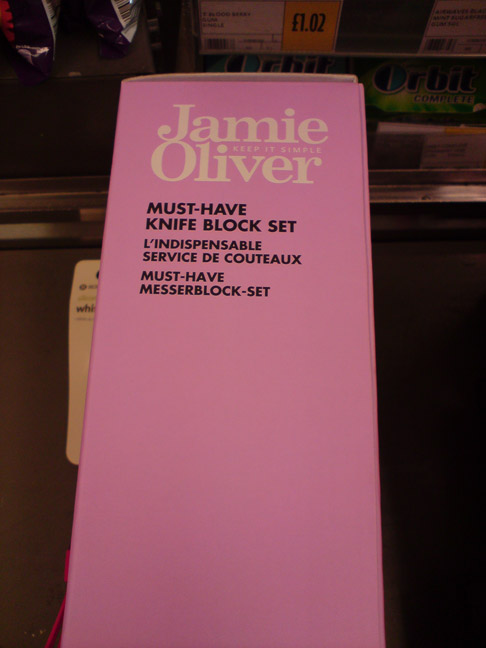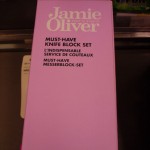Standing in the check-out queue at my local supermarket yesterday afternoon, I noticed that the person behind me was buying a Jamie Oliver knife block set.
Like many products these days, it is labelled in several languages. The German, however, was easier to understand than usual. Why does it say that the product is “must-have”, and why is it a “set”? What’s wrong with the word “unentbehrlich”, or some other equivalent, and wouldn’t “Garnitur” fit the bill for ‘set’? My German is not very good, so there may be a perfectly reasonable explanation for the use of English words in this context, but if someone English were to use foreign words in such a way, then they would be considered to be very uppish, and the reaction would be “Oooh, get you!”.



October 15, 2011 at 11:38 am
What’s wrong with the word “essential” anyway?
October 15, 2011 at 1:17 pm
You can’t call it German at all! ‘Set’ is just about naturalized enough to be gendered (albeit with alternative genders), but not naturalized enough to form a compound without a hyphen, apparently. And ‘must-have’ is not naturalized enough to agree with any gender.
If you squinny between ‘Jamie’ and ‘Oliver’ in his must-have livery, you can just make out ‘Keep it simple’. Not the uppish ‘Faites simple’, then.
October 15, 2011 at 4:08 pm
Welcome to the world of Marketing German. Germans do not talk like this, nor would they ever be caught admitting they fall for this (in fact the idea of a German equivalent of the silly French Loi Toubon keeps coming up in the feulletons…) Market research, however, shows they are indeed more willing to buy stuff when said stuff is labelled in barely germanised English (or is it heavily anglicised German?) Go figure.
October 17, 2011 at 10:42 am
It’s blunt, dull, dry, uninspiring advert speak.
October 21, 2011 at 12:31 pm
lukas, what do you mean by “in the feuilletons”, though? 🙂
That looks like an interesting example of an originally French word being used in its German sense in a piece of English — where “feuilleton” is, I would guess, a word known to far fewer than one in a thousand English-speaking readers!
I’ve almost always come across it before as the French word for a serial story, i.e. a piece of fiction appearing in instalments, originally in a newspaper and later, by extension, on radio and television. In early French newspapers, it seems, these serial stories were commonly printed across the columns in a ruled-off section (below the news reports) at the foot of the news pages. (Hence the diminutive form “feuilleton”: they were “part-pages”, less than a complete “feuille”, or leaf).
It appears that other regular, not strictly news pieces would also appear in these foot-of-the-page spaces, especially theatre and book reviews and other comment and criticism pieces. It is this aspect that the Germans appear to have picked up on in their use of the word (while the French language seems to have concentrated on the “serial-story” meaning), so that when a German talks about “die Feuilletons” I would say we can take him to mean what would, in British English at least, be called the “commentary columns” or “review sections” of the newspapers.
But we certainly call neither serials nor reviews “feuilletons”..! 🙂
October 21, 2011 at 3:02 pm
Ah yes, I should have written “Feuilletons”. This journalistic outlet for Germany’s chattering classes doesn’t seem to have an exact British equivalent.